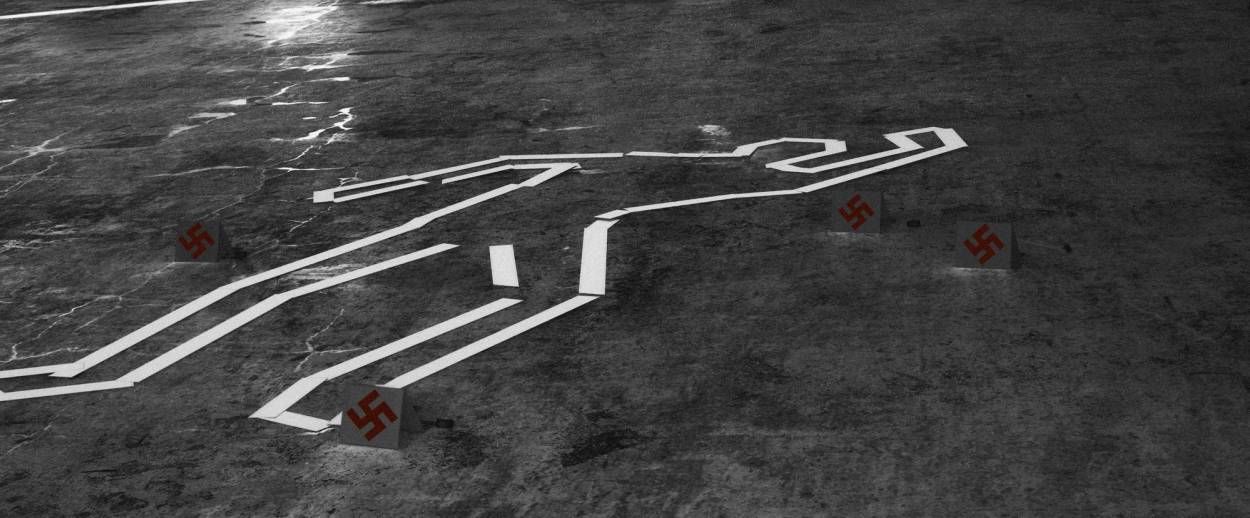A Noir Detective Named Bernie Solves Crimes in 1938 Berlin
Bookworm: The dude of Philip Kerr’s ‘The Pale Criminal’ abides—Nazis




Young Aryan girls have gone missing and are turning up dead. Who but the Jews could possibly be responsible for such a crime? Detective Bernie Gunther’s world, set in the late summer of 1938, is bursting with a sort of palpable internal pressure which, only months later, would be strong enough to break glass.
Noir author Philip Kerr’s Nazis are not soldiers, but day-to-day operatives and bureaucrats, stomping around Berlin, sweating, smoking, clicking their heels. It’s a rare glimpse of the Nazi; paradoxically, it’s only when we can see the actual human hands operating the Nazi apparatus that the Third Reich gets its evil groove back. I actually hate Kerr’s Nazis. I want to punch them in the face. What better time to feel this sense of moral outrage than in 1938 during the weeks leading to Kristallnacht, when Kerr’s The Pale Criminaltakes place.
As it turns out, Nazi Germany, with its mix of morally bankrupt villains and incompetent cops who focus more on slander of the Reich than solving actual crimes, is the perfect bureaucratic backdrop for noir. The world of Nazi Germany can feel just as tragically immutable, as shoulder-shruggingly unconcerned with protecting and serving the people as Los Angeles of the 1930s. And it has some wonderful cheap shots against Hitler too, such as the suggestion that a passage in Mein Kampf is an admission of syphilitic dementia. I never really thought I’d get so swept up in something like this. But I did. And I feel so ridiculous for it.
Like any quality pulp detective-fiction writer, Kerr returns always to the stories of a single detective. In his case, Bernie Gunther, the world-weary, cop-turned-private-dick who spits at the Gestapo but who occasionally says a heil Hitler to keep readers on their toes. One of the classic noir setups is the detective as a man tussling with the stickiness of his surroundings. There’s plenty of that here.
The Pale Criminal is a story with so many twists and turns that it can only really be described as a big scheme in which Bernie Gunther is called back onto the force only to discover that the individual murder cases he’s been looking into are actually part of a large blood libel aimed at kicking up even more anti-Jewish sentiment. Unlike L.A. and San Francisco noirs, the city and the time are more than a literary backdrop or convenience, and the plot involves more than just a bait and switch of a rare artifact or the cover-up for the peccadilloes of a rich tycoon’s daughter. It is part of the greater narrative of how Jews became Europe’s sacrificial bad guys.
What makes Kerr’s Noir Berlin even more fascinating is how real it can feel at times. Not only does Kerr invoke historical figures like Karl Maria Wiligut, the Nazi occult medium, but the murderer of these young girls looks suspiciously like the S-Bahn serial killer who was active in Nazi Germany.
And it is not just 1938 Berlin that is exceptionally well suited to noir. It’s Bernie, too. He isn’t just a jaded ex-cop who has seen too many bodies to care. He is, like any great noir detective, that perfect mix of relentlessly analytical and a man beyond time. He has no prejudices because he has seen it all. He is comfortable everywhere because he is equally uncomfortable with all manner of human interaction because somehow he doesn’t belong anywhere. He is without a home.
For someone working at a time when races were categorized by levels of superiority and homosexuals were sent to camps, it’s no small feat to be fundamentally unconcerned with how individuals choose to live their lives. In noir, people are just a collection of inclinations and vices and improprieties. If it’s not one thing, it’s another. And yet there are still evils—like the Nazis, for instance. Laced into Bernie’s contempt of Nazis is ridicule. They are ridiculous for taking themselves so seriously and for such a wrongheaded attempt at creating order of human life.
Noir morality is a mix of moral relativism and absolutism. This sort of equivocation is how readers of noir absolve detectives, even those, like Bernie, who are essentially working for the Nazis, while also in some ways working against them, and despising them. In the back of every thought you can hear him saying this whole Nazi thing is going to blow over, and then it’ll just be something else.
Noir is a lesson in how to live timelessly and sloppily. You can never really tell if Bernie Gunther scorns humans or loves them, and so he trudges on, smoking and flirting, flirting and smoking, until he unravels a knot that no one else could.
But part of noir is also a sense of inevitability because one of the world’s greatest inexorable truths is evil itself. Bernie knows that before long something will burst. Over just a few years the Nazis worked quickly and efficiently to tease out latent anti-Semitism into a full-fledged animal hatred. Kristallnacht was one of the first signs that their scheme had worked.
Noir is an exercise in recognizing this inevitability and carrying on all the same, not for some thrill of solving the puzzle, but almost as if to spite evil itself, to let it know that not everyone was duped. To stare it down and say I know what you are. If we love detectives like Bernie so much it is because they show us a version of ourselves that didn’t do nothing, that didn’t play along with the evils that breed in human societies as if we actually belonged.
***
Read Alexander Aciman’s Bookworm column in Tablet magazine on Mondays.
Alexander Aciman is a writer living in New York. His work has appeared in, among other publications, The New York Times, Vox, The Wall Street Journal, and The New Republic.